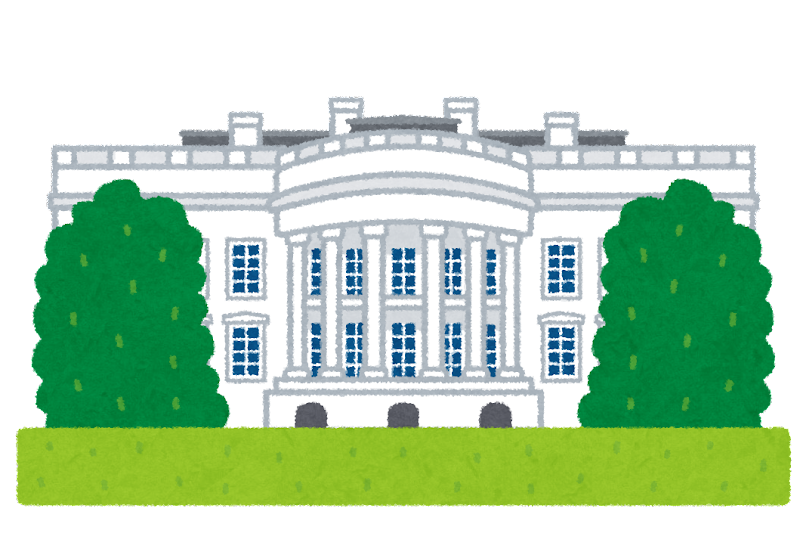The White House and The Hill
This article originally appeared in the February 2024 issue of CONNECT.
Erik Jacobs (Hyogo, 2013-2016)
U.S. and Asia Policy Manager, Access Partnership
Former White House Office of Science and Technology Policy Advisor, Executive Office of the President
David Boling (Ibaraki, 1988-1989)
Director, Japan and Asia Trade, Eurasia Group
Former Deputy Assistant U.S. Trade Representative for Japan
Interview by Kimberly Matsuno (Niigata, 2019-2022)
Just as we’ve done with our previous spotlights, let’s start with the questions: Why JET? Why Japan?
Erik:
My grandfather was a WW2 veteran in Okinawa. I grew up hearing a lot of stories from him and found Japanese culture fascinating through his stories. But nothing really came from that until I went to Temple University to play football. After my time playing football ended, the honors program counselor suggested I go to Japan and study abroad at their Japan campus. However, my semester abroad was quickly cut short by the devastating Great East Japan Earthquake of 2011.
Even though my time in Japan was short, it solidified my interest in Japan and the Japanese language, and I ended up getting a certificate in Japanese back in the U.S. in addition to my Political Science degree. I applied to the JET Program after graduation because I still wanted that chance to live and work in Japan.
David:
As for me, my interest in Japan happened a bit more by chance. A friend of mine was taking a Japanese class at the University of Arkansas and their professor mentioned the JET Program one day. My friend mentioned it to me in passing and it sounded like a good experience. There was a tremendous amount of interest in Japan in the mid-’80s, the salary was great for that time, and since the program was affiliated with the Japanese government, it seemed reputable to me. I was at a stage where I wanted a little disruption in my life anyway, so I applied.
I ended up taking a year off from law school to participate in the JET Program.
So while we’ve all heard the term “foreign policy” in regard to federal governments, I’ve learned that the private sector also has foreign policies and hires people like you, policy managers. Can you explain what is policy management and what policy managers do?
Erik:
A major part of my current job is to act as a consultant. I help clients manage and draft legislation, policies, and strategic plans related to technology. I inform them about what is going on in Japan (or Asia), in regard to technology, so they can make better-informed decisions for their company.
My job involves a lot of tracking what is going on policy-wise in Washington D.C. as well as Japan and finding the best way to support clients. The job involves a lot of communication and engagement with my network to stay informed.
David, currently, you work as the Director for Japan and Asia Trade for Eurasia Group, a firm specializing in political risk analysis and consulting. Can you explain the difference between political risk consulting and policy management?
David:
Policy management (especially at the government level) is a lot about problem-solving. You usually have a specific problem that you are trying to fix with a policy solution. An example would be if a U.S. company had a problem entering the Japanese market due to a government barrier, you would try to make it easier for them by advocating to the Japanese government to make changes to laws or regulations to ease market entry for the U.S. firm.
As political risk consultants (for the private sector), our clients are mostly investors or global corporations that are trying to make future-oriented investment or business decisions. So we (as political risk consultants) assess future political risks for our clients that could impact those decisions. We share our analysis with our clients who use them to make their own investment or business decisions.
It’s important to note that Eurasia Group is not a think tank or a government relations advocacy organization. We are really in the business of analyzing political risk and making forecasts for our clients. We are very future-oriented in our analysis.
We’ve discussed the differences between policy management and political risk analysis, but, David, you also served on the public sector side of things as a negotiator at the Office of the U.S. Trade Representative. What do trade negotiators do on a day-to-day basis?
David:
Trade negotiators spend a lot of time writing memos! It may not sound sexy but it’s true.
While trade negotiators are like diplomats and often meet with foreign government representatives, a large portion of my job included writing memos for senior leadership. Those memos would prepare senior officials for key meetings or to make important policy decisions. I also was involved a lot in coordinating with colleagues from other departments (agriculture, health, etc) to provide the best information to senior U.S. government officials who then went on to negotiate deals with senior foreign officials.
Erik, Working as a White House Policy Advisor and being involved in such high levels of government as you have seems like an extraordinary (and elusive) career to many people. Would you say becoming a policy advisor for the federal government is a viable career path for JETs?
Erik:
Japan is such an important ally to the U.S. that there are plenty of opportunities for JET alumni in the government. But you have to network and be deliberate about your planning if you want to work in the highest levels of government. I was very fortunate to get a political appointment, but I strongly believe that it was because of the connections I made and the network that I created for myself when I earned a spot as a White House intern.
I would strongly encourage current JETs and JET alumni to go to alumni events and just start talking to people. When I was in government, I found that JETs are everywhere—including in the White House—and our shared experience always provided that instant connection. And I’ve always found that people love to help out younger people on their career path, especially if they feel a connection to them. So don’t be afraid to approach people at alumni or networking events. The worst they can say is they are out of business cards.
Would you say a degree in law, public policy, or political science is necessary to get started on this path?
David:
I am often asked this question. And my answer is always “It’s not necessary, but it helps.”
Working in the federal government is a lot about specialization. Trade negotiations especially can be quite technical. So you really need to know a lot about whatever subject is being negotiated (agriculture, car manufacturing, etc).
I think it is a viable path for JETs if they are interested in trade, but I would stress that it’s important to think about all the government agencies out there. I always like to bring up positions in state government—because they so often get overlooked. State governments need people with international experience in areas like economic development. There are also political positions like working on a campaign, which can be very rewarding.
If you really are determined to work at the federal level, I also think Capitol Hill is a great place to work (especially when you are young). It’s a very dynamic place. Offices on Capitol Hill tend to hire more frequently and there is a lot of staff turnover. It’s a great place to get a foot in the door and build experience, which can then lead to an executive branch position.
Do you have any words of advice for JETs who wish to work in foreign trade/policy?
Erik:
It’s important to find what specific issues motivate you and get to know them as deeply as you can. I strongly recommend reading across the spectrum and staying as informed as you can.
And know that it’s OK, and even advisable to find a niche interest where there aren’t a lot of people talking about it—because that’s often where opportunities are. But if you do so, you need to also find a way to explain why it is important and why people should care.
David:
I also believe it helps to have expertise—outside of the JET experience—and to develop that expertise.
The JET experience is fantastic in so many ways, but it may not be enough to get you where you want to go. If you want to work on Capitol Hill or really in any section of government, you need to combine the JET experience with law or expertise in a particular field. To get into a career in foreign policy, you have to think of JET + X.
About the Authors
Erik Jacobs (Hyogo 2013-2016) taught English as an Assistant Language Teacher on the Japan Exchange Teaching (JET) Program from 2013 to 2016 in the coastal city of Kobe-shi, Hyogo Prefecture. After returning from Japan, Erik worked in the White House Office of Science and Technology Policy and the U.S. Department of Energy. He has been involved in the U.S.-Japan relationship in various capacities, including as the project manager for the ministerial-level 14th Joint High-Level Committee Meeting on Science and Technology Cooperation at the White House in 2019 and staffing two Vice Presidential visits to Japan in 2018. Erik holds an MA in Asian Studies from Georgetown University and a BA in Political Science from Temple University. He continues to comment on U.S.-Japan relations in various capacities, with a focus on science and technology policy.
Based in Eurasia Group’s Washington DC office, David Boling (Ibaraki, 1988-1989) leads the firm’s coverage of Japan and works on Asian trade issues. Before joining Eurasia Group, he served for more than seven years as a negotiator at the Office of the U.S. Trade Representative, where he helped negotiate the U.S.-Japan Trade Agreement and Japan-related provisions of the Trans-Pacific Partnership Agreement. He has passed the highest level of the Japanese Language Proficiency Test.
Earlier in his career, David worked as an antitrust prosecutor for the U.S. Justice Department and spent one year in the Japanese government as a Mike Mansfield Fellow. Later, he served as the vice president of the Mansfield Foundation, which focuses its activities on Northeast Asia. He also spent time on Capitol Hill as the chief of staff to a member of Congress and launched a political candidacy of his own.
Kimberly Matsuno is a JET alum (Niigata 2019-2022) currently serving as USJETAA‘s Programs & Communications Coordinator. She was an ALT in Niigata from 2019-2022, during which time she contributed to CONNECT Magazine as both a writer and a section editor. She is excited to continue contributing to CONNECT and to assist in fostering relations between current JETs and the JET alumni community.



![CONNECT ART ISSUE 2024 SUBMISSIONS [CLOSED]](http://connect.ajet.net/wp-content/uploads/2024/04/ARTISSUE-INSTA-600x500.png)





